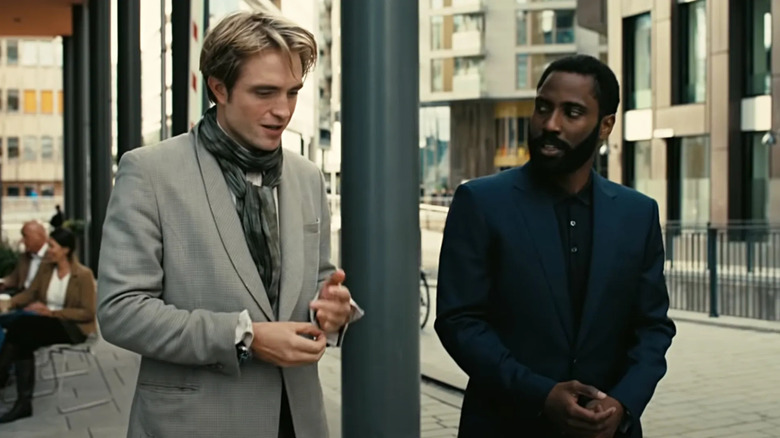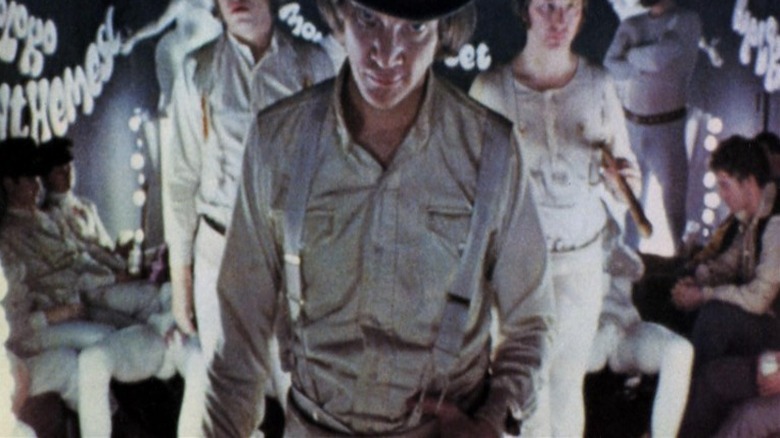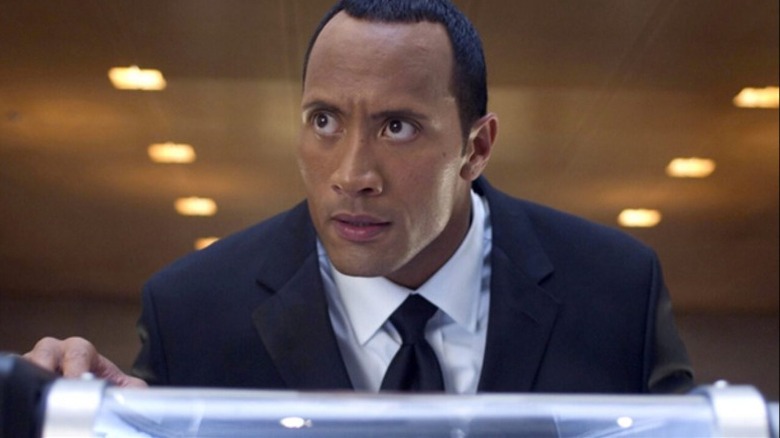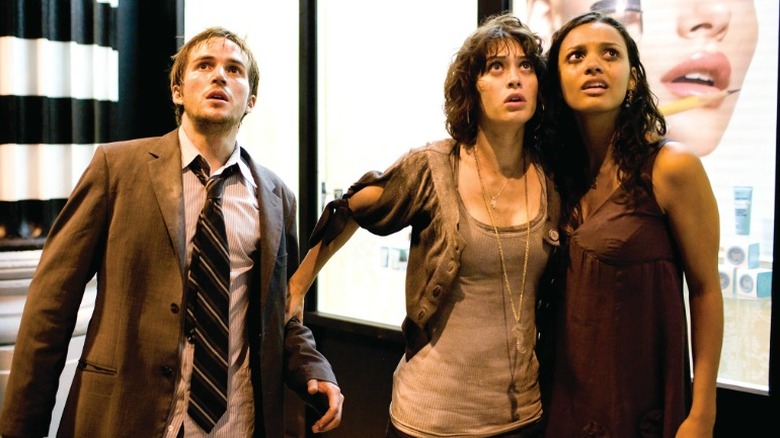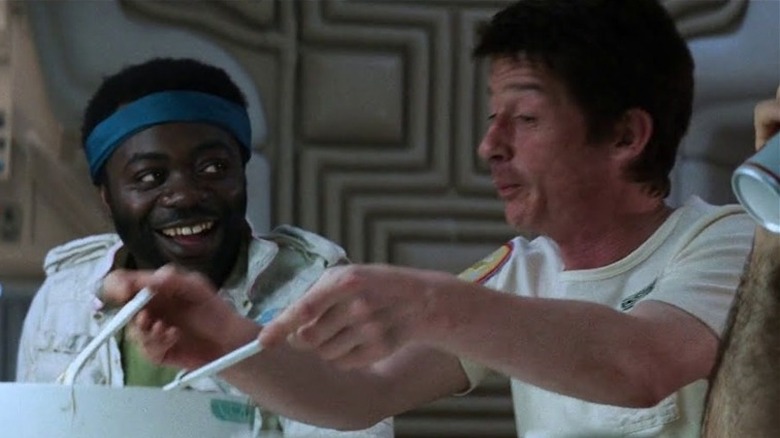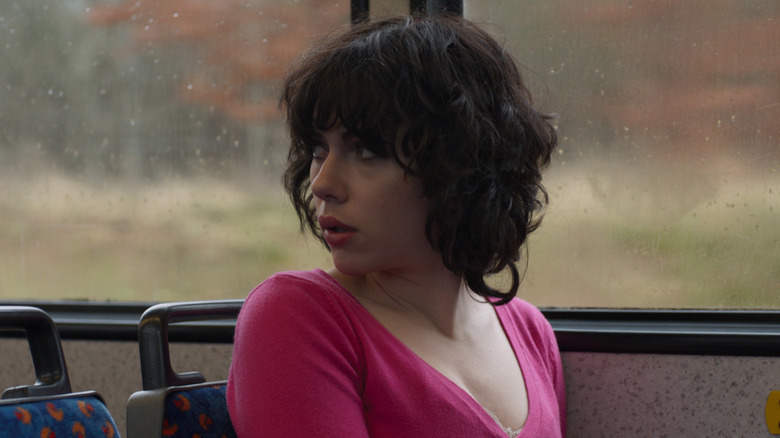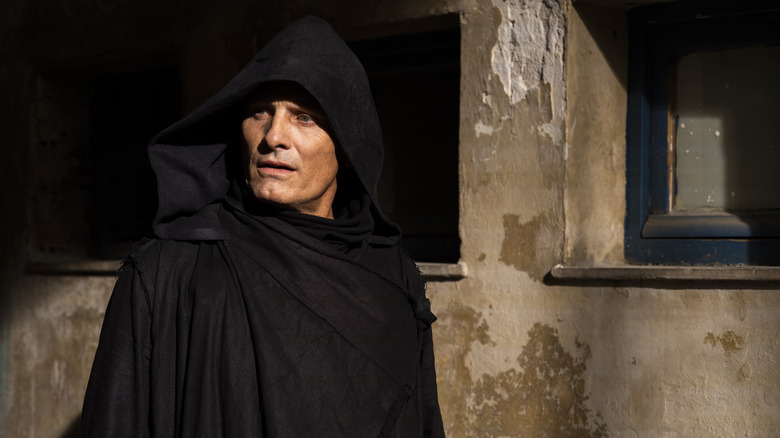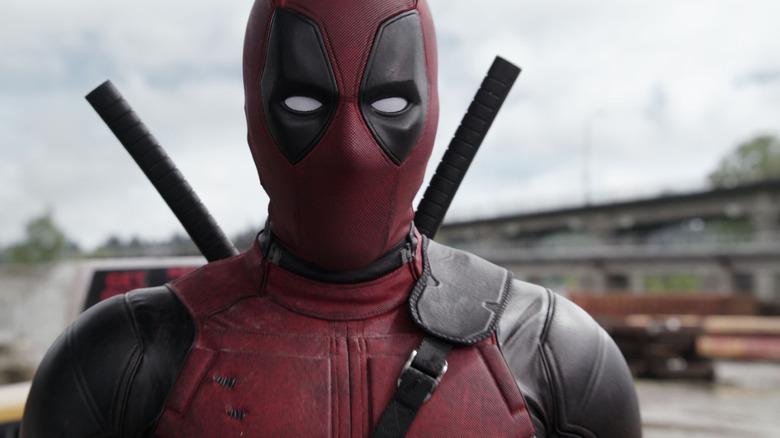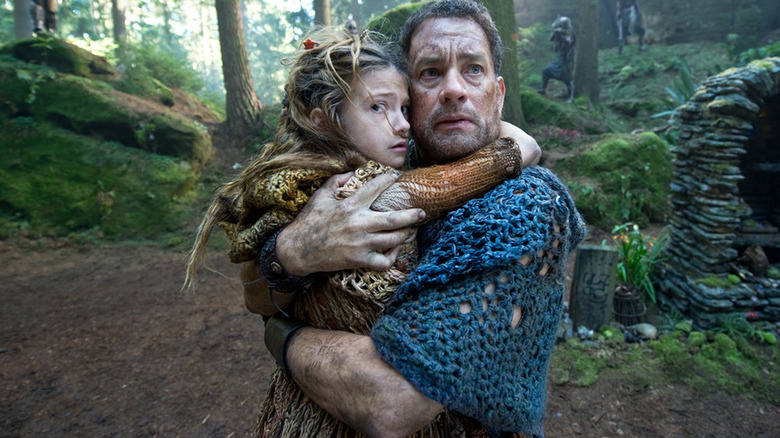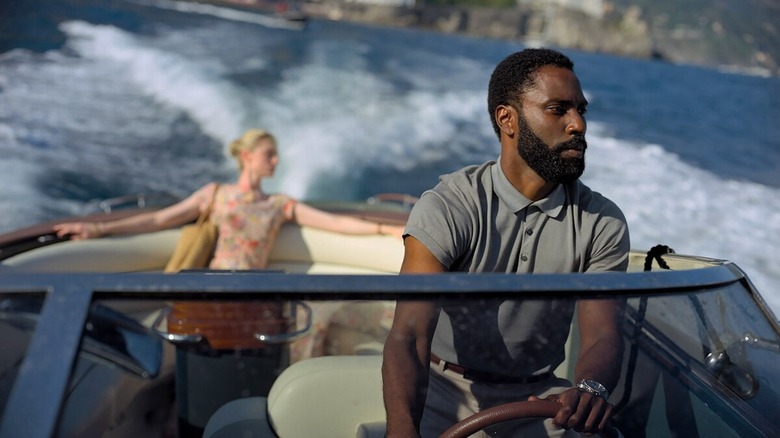Sci-Fi Movies That Made Audiences Walk Out
We may receive a commission on purchases made from links.
It's no secret that going to see a movie in the theaters is becoming a more expensive hobby. Some theaters have begun using variable pricing models, and shorter release windows have made new films readily available at home soon after they leave the theaters. There are also many films available to watch at home on streaming services like Netflix, Amazon Prime Video, Hulu, HBO Max, Disney+, Apple TV+, The Criterion Channel, Shudder, and Peacock, among others. If you do decide to go out to the theaters, it's a special treat. You're expecting the best experience. Even if you're somewhat underwhelmed by the movie that you are watching, it may take a lot to convince you to leave the theater. However, sometimes movies cross the line where audiences are no longer comfortable staying in their seats. At home, you at least have the advantage of just turning off your television or laptop.
Horror movies occasionally inspire audience walkouts due to their graphic violent content. Science fiction films can generate similar reactions, though sometimes the fault isn't with the film itself but with the marketing. "It Comes At Night" from 2017 is a great example, where an excellent post-apocalyptic thriller was made to look like a spooky creature feature in the trailer A24 released. Audiences who got a depressing story about the depravity of mankind when they were expecting a scary monster movie may have been confused. Here are 10 sci-fi movies that actually made audiences walk out.
A Clockwork Orange (1971)
The legendary filmmaker Stanley Kubrick is certainly one of the greatest directors of all-time, but he's no stranger to controversy. Kubrick's 1971 masterpiece "A Clockwork Orange" generated significant blowback during its initial release. It was one of the rare mainstream films to be released with an "X" rating from the MPAA. Before the NC-17 rating was created in 1990, the "X" rating was used for films that were too extreme to simply be rated "R." Many audiences avoided "X" films because they were assumed to be pornographic.
"A Clockwork Orange" is a deeply disturbing film about the institutional failure to curb youthful violence. The film centers on the young gang leader Alex DeLarge (Malcolm McDowell). Alex leads a pack of young men to pillage and brutalize women in a futuristic version of Britain. One of the more disturbing elements of Kubrick's direction is the association of Alex's "ultra-violence" with familiar music: Alex loves the work of Beethoven and even sings "Singin' in the Rain" during one of his crime sprees. Over five decades later, "A Clockwork Orange" holds up as a powerful examination of the generational divide. It's also just as disturbing as it was during its initial release. The film was so shocking for audiences that some attendees chose to leave the theater because they couldn't stomach the depravity. In hindsight, this may have helped to prove Kubrick's point, and the controversy the film generated is one of the reasons it became a cult classic.
Southland Tales (2006)
There were high expectations for Richard Kelly's second feature film, a science fiction dystopian satire called "Southland Tales." Kelly had proven that he was a director worth watching with his 2001 feature film debut, "Donnie Darko." The notion that Kelly's second film was even more ambitious was something to get excited about. Not only was Kelly telling another original story, but he had a politically relevant message about the disparity between political parties, the worship of celebrity culture, and the dominance of corporations. "Donnie Darko" employed many unknown actors, but "Southland Tales" featured Dwayne Johnson (at the height of his WWE stardom) and Sarah Michelle Gellar (shortly after the conclusion of "Buffy the Vampire Slayer").
Unfortunately, "Southland Tales" received a disastrous response when it debuted at the Cannes Film Festival in 2006. After the first screening, famous film critic Roger Ebert wrote that he "was dazed, confused, bewildered, bored, affronted, and deafened by the boos" from the crowd. Some audiences left the theater because they were so disappointed. However, "Southland Tales" has emerged as a cult classic, and its themes are even more relevant today. In hindsight, this isn't the only time that the Cannes Film Festival has shamed a great film that was ahead of its time. "Taxi Driver," "The Tree of Life," "Twin Peaks: Fire Walk With Me," "Holy Motors," "Only God Forgives," and "The Neon Demon" are all films that are worth watching with a more level-headed perspective.
Cloverfield (2008)
Disappointment isn't the only reason that audiences walk out of a movie. Sometimes a viewer may be really interested in the film's narrative but disturbed by the content of the film itself. Even if you're watching a great movie, it's certainly not worth getting sick over! Horror films have a history of making their audiences nauseous due to unusually graphic sequences. The 2008 science fiction film "Cloverfield" was shrouded in mystery before it was released. Given the secrecy of the trailers, some fans took to the Internet to speculate about what the film's plot really was. This was during a time in which found footage movies weren't as common. Although "The Blair Witch Project" made the subgenre popular in 1999, found footage films weren't quite the phenomenon that they are today.
Audiences had no idea what to expect from "Cloverfield" when they came to theaters. Perhaps a warning may have been nice. The shaky nature of the found footage filmmaking techniques took some viewers off guard, with some audiences reporting that watching the film gave them motion sickness. Despite its box office success, "Cloverfield" generated walkouts during its initial theatrical run. The "Cloverfield" franchise continued to use non-traditional marketing techniques to gain audience interest. "10 Cloverfield Lane's" connection to the franchise was revealed with a surprise trailer, and "The Cloverfield Paradox" was given a zero-warning release on Netflix after the 2018 Super Bowl.
Alien (1979)
Ridley Scott's 1979 masterpiece "Alien" remains one of the most important science fiction films of all time. While it certainly didn't invent the subgenre of "outer space horror," it proved that the two popular genres could be successfully merged in a way that mainstream audiences would find exciting. "Alien" was released during a period of growth for space movies after the success of 1977's "Star Wars" was followed by "Close Encounters of the Third Kind," "Superman: The Movie," "Moonraker," and "Alien."
Although "Alien" was thought of as a success and inspired an incredible franchise, it did generate some controversy during the first few screenings. In J.W. Winzler's extensive nonfiction guide to the film, "The Making of Alien," the author chronicled the extreme reactions that the film's violent content provoked. Any audience member that brought their children expecting a fun, exciting space adventure like "Star Wars" may have been shocked to see the famous "chestburster" scene. The "Alien" creative team remembered that during the first screenings some audience members became nauseous, and others had to leave the theater because the violence made them so uncomfortable. Thankfully, these reactions weren't widespread enough to prevent "Alien" from inspiring one of the coolest science fiction sagas of all time. There are certainly plenty of gross moments in the other entries, such as Ripley's nightmare in "Aliens" and the intense birth sequence in "Prometheus." However, there are few moments in film history as terrifying as the chestburster sequence.
Under the Skin (2013)
If you've ever attended a film festival, you know that it can be a stressful experience. Choosing what films to see, what screenings you will be able to attend, and what is likely to sell out requires a lot of planning and preparation. When you do sit down for a screening, you want to have a rewarding experience. It's disappointing if that experience does not live up to your expectations.
Jonathan Glazer is a filmmaker whose stylistic impulses certainly aren't for everyone. "Sexy Beast" is definitely not a traditional gangster movie, and "Birth" is a very unusual mystery thriller. That being said, Glazer's science fiction film "Under the Skin" is perhaps his most baffling, complex project to date. The body horror film follows a mysterious alien who inhabits a woman's body (Scarlett Johansson) and explores Earth. She lures men to their deaths in order to learn about them. "Under the Skin" is a film that was seemingly made to generate controversy. While it's been hailed by some critics as a masterpiece, it was also a box office disaster. "Under the Skin" sparked mixed responses when it was screened at the 2013 Venice Film Festival. Although many reviews were positive, The Hollywood Reporter journalist Scott Feinberg reported that many audience members walked out because they were bored by the film's methodical pacing. Time may have worked out in favor of "Under the Skin," as BBC critics ranked it as one of the best films of the 21st century.
Crimes of the Future (2022)
This is one that everyone saw coming. David Cronenberg is a brilliant filmmaker, but he seemingly takes pleasure in pushing the audiences' comfort level. A new Cronenberg film is an event, and it's always interesting to see what tricks he has up his sleeves. Cronenberg first rose to prominence thanks to his foundational work in the body horror genre. He created classics such as "Shivers," "Rabid," "The Brood," "Scanners," and "Videodrome." Although recently Cronenberg has been working on social satires and crime thrillers, he returned to the body horror genre this year with his sci-fi feature "Crimes of the Future."
When it was announced that "Crimes of the Future" would premiere at this year's Cannes Film Festival, Cronenberg predicted that some audience members would have to walk out five minutes into the film. "There are some very strong scenes," he said. "I do expect walkouts in Cannes, and that's a very special thing." Cronenberg also predicted that the last few minutes would be too extreme for some viewers, even if they had managed to stick with the film up until that point. Here's a director that knows his audience! During the premiere, the particularly gory opening scene prompted many viewers to leave the theater. Thankfully, Cannes didn't just invite Cronenberg to the festival in order to ridicule him. According to Variety reporter Zack Sharf, "Crimes of the Future” received a standing ovation. Moved by the reaction, Cronenberg said that he was "very touched" by the response.
Deadpool (2016)
Here's one where the audience really should have known better. It was clear from the very first trailer that 2016's "Deadpool" was going to be a very different type of superhero movie than the ones that the MCU and DCEU had been creating. "Deadpool" exercised the full potential of its "R" rating, being about as violent, sexually explicit, and foul-mouthed as you can get. The "Merc With A Mouth" himself might be a big, goofy child at heart, but "Deadpool" is certainly not a movie for kids.
That being said, some parents still managed to mistake "Deadpool" for just another family-friendly superhero movie. There were reported walkouts among families who were shocked by the film's content. The controversy didn't end there. Recently, the R-Rated Marvel films "Deadpool," "Deadpool 2," and "Logan" were added to Disney+. The Parents Television and Media Council criticized Disney for its inclusion, and condemned the studio by saying that "after decades of corporate brilliance establishing itself as the world's most trusted brand for families, today's C-level suite at Disney has decided to flush it all down the toilet." There were some younger superhero movie fans out there that wanted to see "Deadpool," and were disappointed that it was rated "R." In order to satisfy these youthful fans, 20th Century Fox actually released a PG-13 cut of "Deadpool 2" titled "Once Upon A Deadpool." Although this version cut out some of the most extreme moments, it included deleted scenes that were not in the original cut.
Star Wars: The Last Jedi (2017)
At this point, everyone is probably sick of hearing controversial opinions about 2017's "Star Wars: The Last Jedi." It is still a film that divides "Star Wars" fans down the middle. "The Last Jedi" is a film that dared to do the unexpected. Instead of catering to nostalgia and fan theories, Rian Johnson's subversive adventure offered a more nuanced perspective on the role that the Jedi have played in galactic history. As Luke Skywalker (Mark Hamill) notes in the film, the Jedi Order's ultimate legacy is one of failure. Even during the prominence of the Galactic Republic, Chancellor Palpatine (Ian McDiarmid) was able to rise to power and create the Galactic Empire.
Unfortunately, "The Last Jedi" was met with toxic responses from online fans, many of whom attacked the film for its diverse cast. However, there is one "Star Wars" fan who decided to leave the theater for a completely justified reason. In an extended interview with Stephen Colbert, broadcast anchor Anderson Cooper revealed that he and his partner had to leave the theater about 45 minutes in. Cooper stated that he was simply overwhelmed by the stress of his job and that he couldn't give the film the attention that it deserved. Hopefully, Cooper and his partner got the chance to catch another screening of the film later on when their minds were clear. Their struggle is understandable, since at 152 minutes "The Last Jedi" is the longest entry in the franchise so far.
Cloud Atlas (2012)
David Mitchell's 2004 science fiction novel "Cloud Atlas" was once deemed "unfilmable," but that wasn't enough to scare Lana and Lilly Wachowski, who collaborated with director Tom Tykwer to bring the ambitious story to life. "Cloud Atlas" is a film that is nearly impossible to understand after just one viewing, crosscutting events in the Pacific Islands in 1849, Cambridge in 1936, San Francisco in 1973, London in 2012, Neo Seoul in a dystopian 2144, and a mysterious island in a post-apocalyptic era. Unfortunately, some viewers didn't even make it past the first viewing, with the film critic Omer M. Mozaffar recalling that many viewers at his screening walked out of the theater after the first hour.
"Cloud Atlas" is a film that demands the audience's attention. If you only watched the first hour of the film, it probably felt like nothing more than a series of chaotic misadventures. It's also very confusing, as cast members like Tom Hanks, Halle Berry, Hugh Grant, Ben Whishaw, Jim Broadbent, Hugo Weaving, and Keith David play multiple characters in different timelines. However, "Cloud Atlas" ultimately pays off by showing the thematic links between its six eras, with a hopeful message about the inherent goodness of humanity. A decade after its release, "Cloud Atlas" is oddly comforting as a testament to cinematic ambition at its finest. Hopefully, viewers who walked out will give it another shot.
Tenet (2020)
Any film directed and written by Christopher Nolan is bound to be pretty complex. That being said, 2020's "Tenet" may be the most complicated film in Nolan's entire filmography. The film explores the concept of "time inversion," and features a non-stop barrage of expositional dialogue. There is so much information being thrown at the screen that even the characters struggle to understand what is going on. In one inadvertently hilarious moment, The Protagonist (John David Washington) tells his associate Neil (Robert Pattinson) that he has to "keep up." The team's fixer, Mahir (Himesh Patel), describes one of the heists in the film as "nuts."
Unfortunately, some viewers had a hard time understanding "Tenet," but it wasn't just because of the story. Some viewers criticized the film's audio mixing and complained that the dialogue was difficult to understand. The mixing was such an issue for some fans that they walked out of the film. It's definitely an understandable reason to leave since if you miss just one line in "Tenet" you might be completely lost. This isn't the first time that a Christopher Nolan film's audio mixing was the subject of controversy. After the prologue of "The Dark Knight Rises" screened in front of select IMAX showings of "Mission: Impossible — Ghost Protocol," some viewers found it nearly impossible to understand what Bane (Tom Hardy) was saying. "Interstellar" faced backlash as well, where audiences reported that the music and sound effects were so loud that they drowned out the dialogue.
